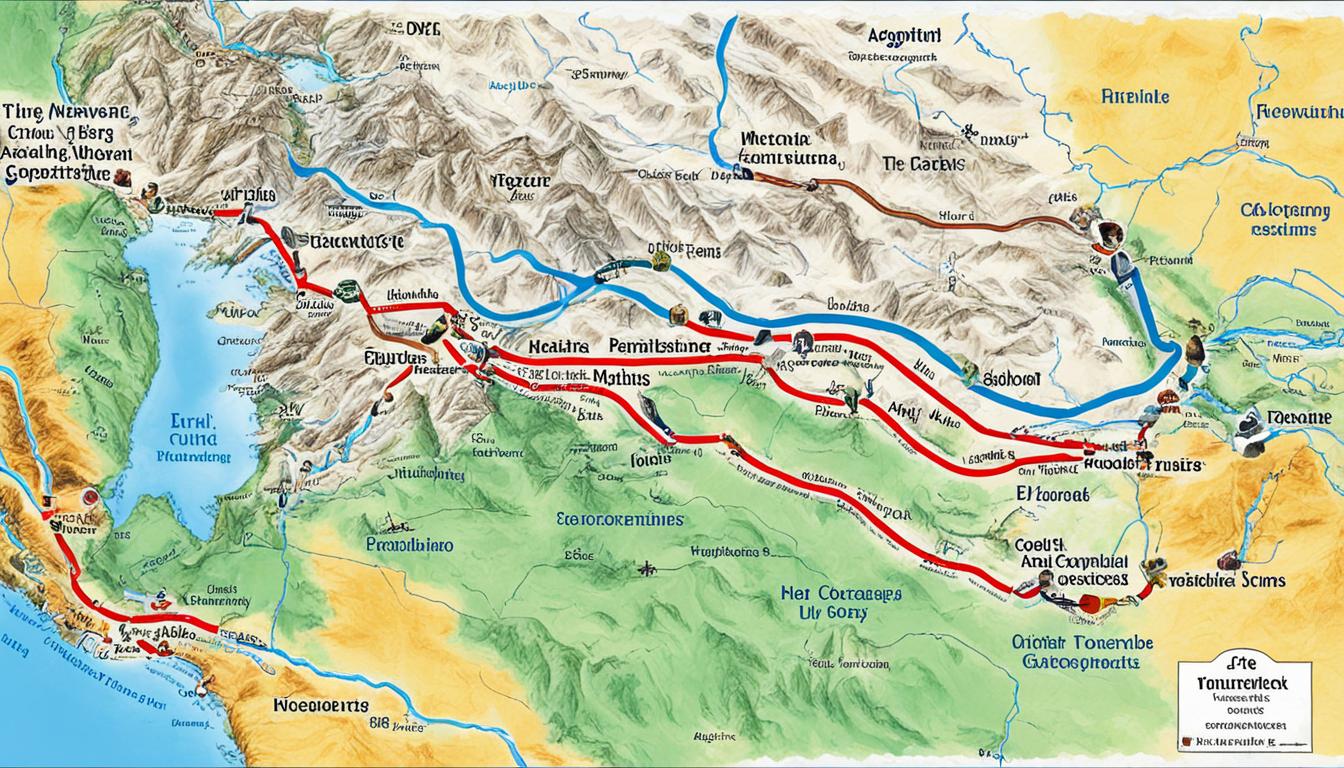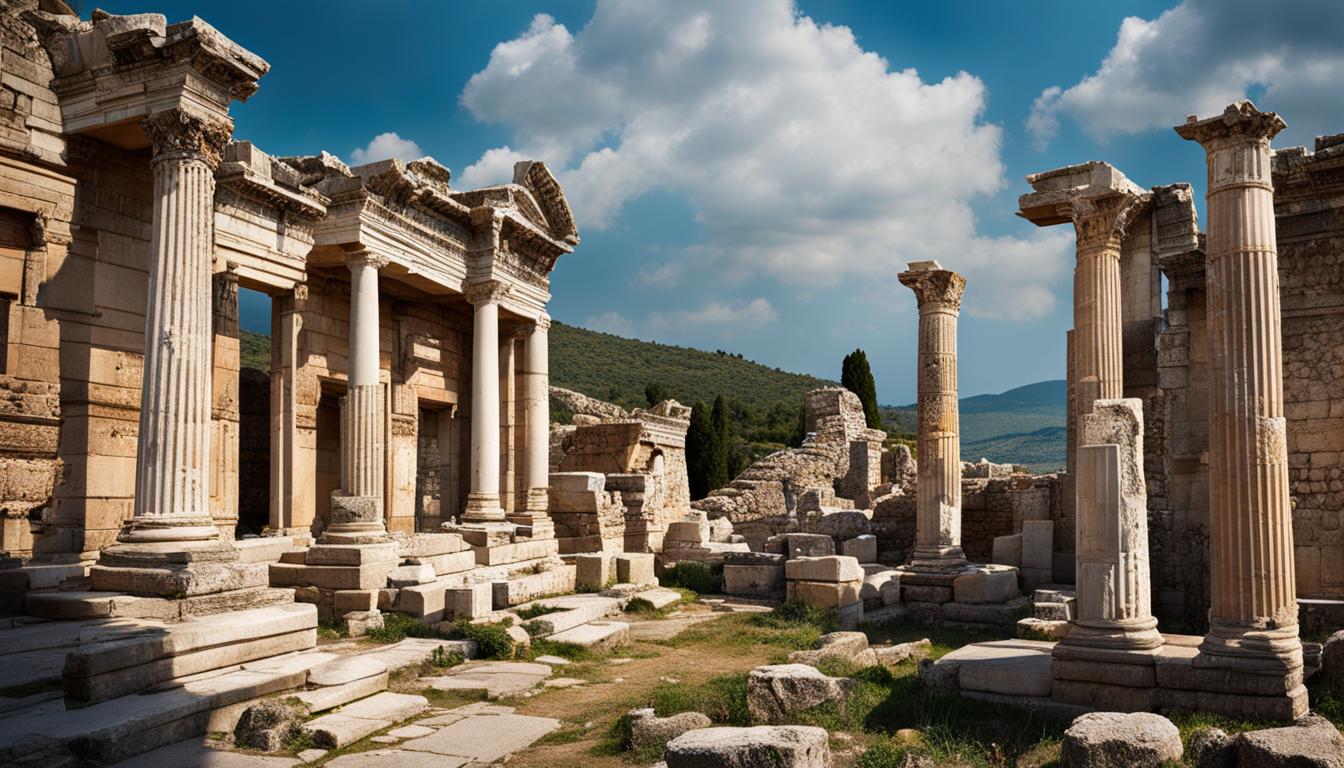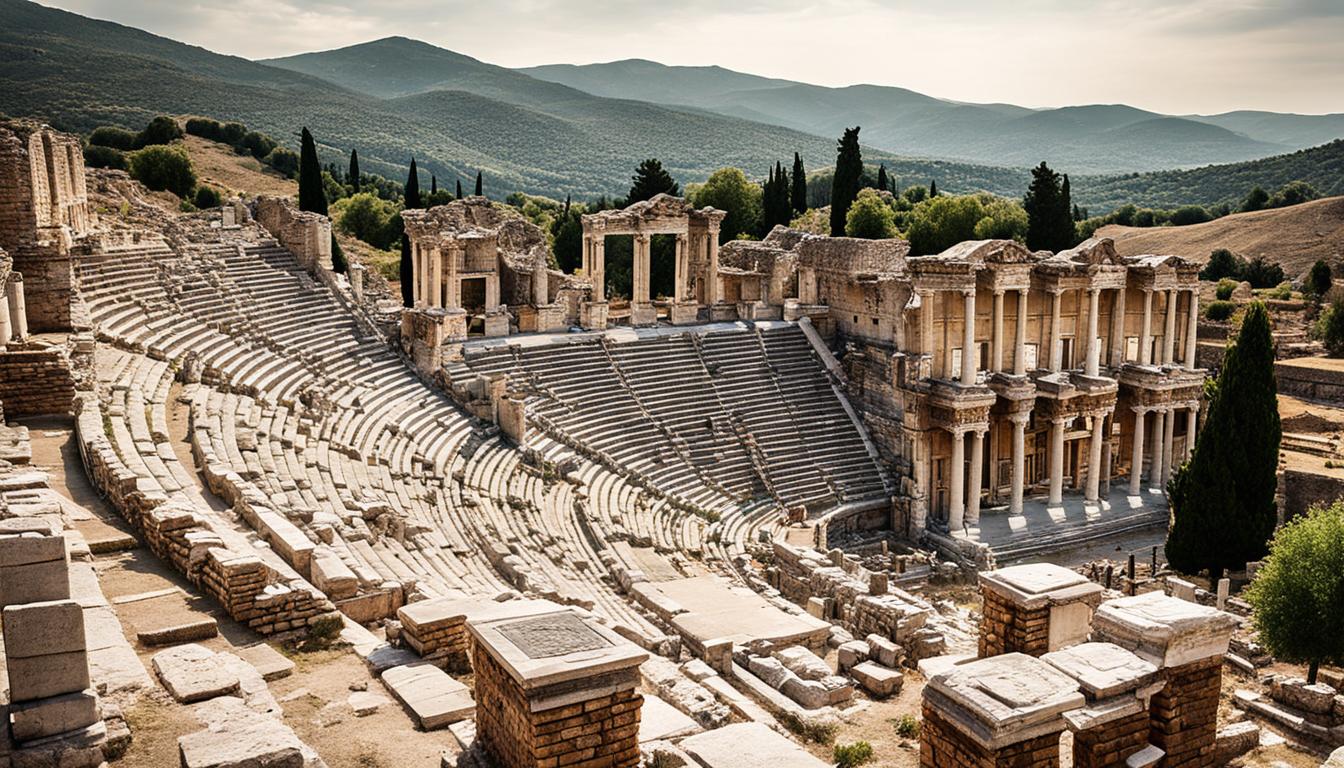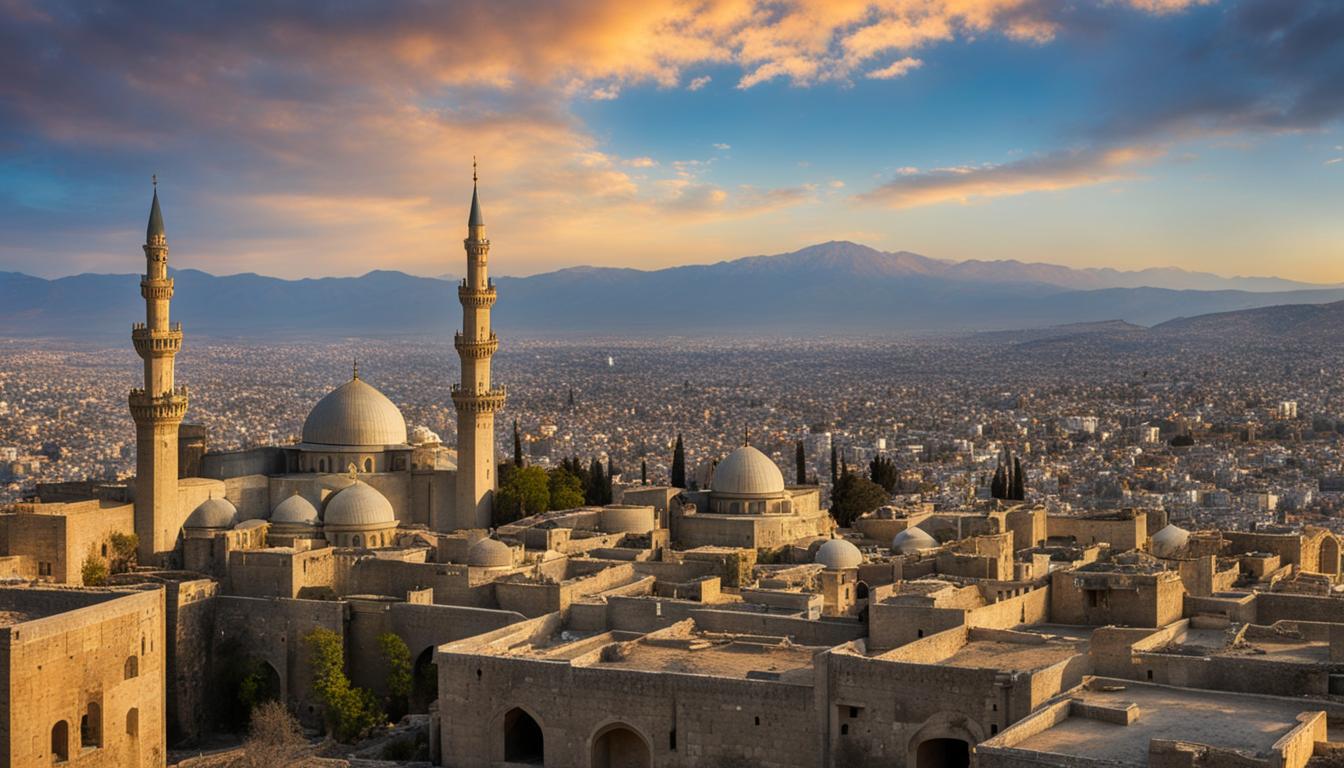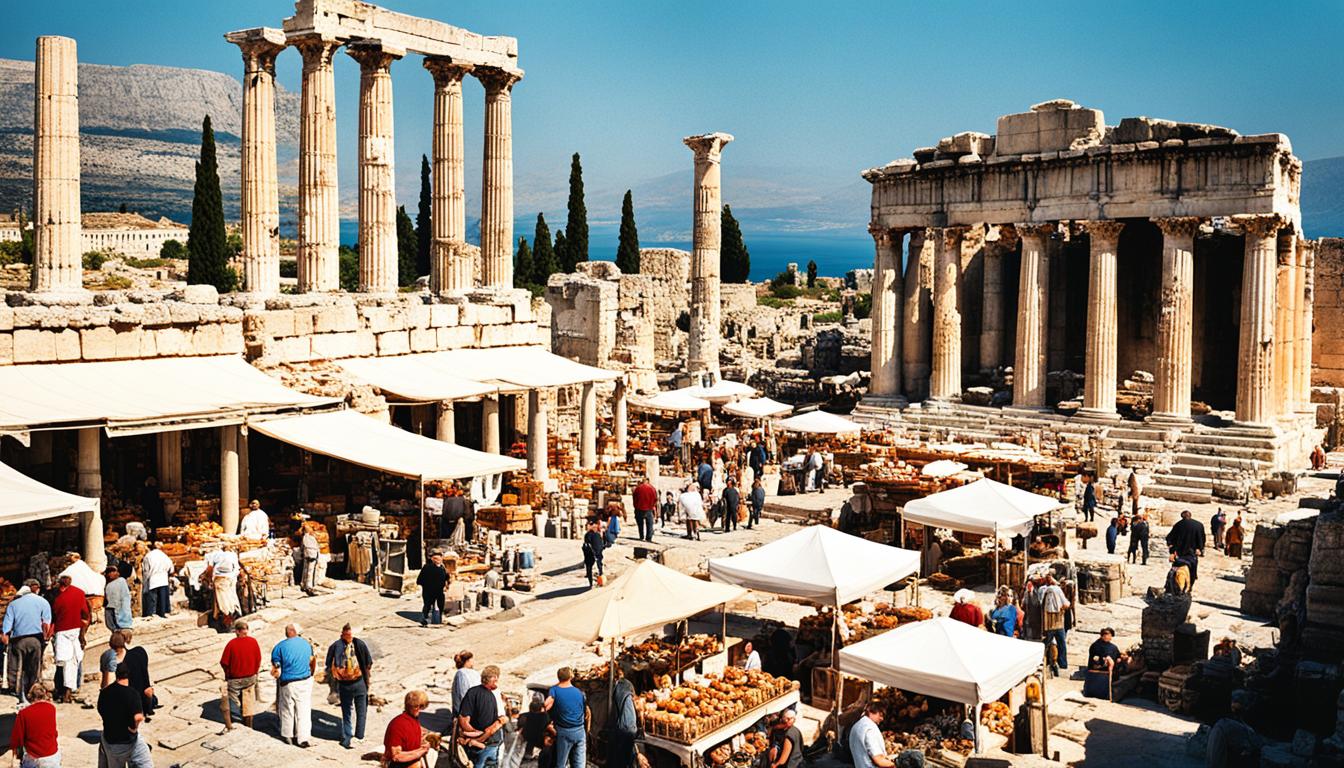The Apostle Paul, also known as Saint Paul, is a prominent figure in the history of Christianity. His missionary journeys played a vital role in spreading the message of Jesus Christ and establishing early Christian communities. In this article, we will delve into the cities and regions that shaped Paul’s journeys and explore the significance of his missionary work.
Key Takeaways:
- Paul’s journeys were instrumental in the growth and development of Christianity.
- He traveled to various cities and regions, establishing churches and spreading the gospel.
- Paul’s epistles (letters) provide valuable teachings and insights into early Christian theology.
- His conversion on the road to Damascus marked a turning point in his life and ministry.
- Paul’s missionary journeys continue to inspire believers and shape the understanding of faith.
Paul’s First Missionary Journey
During his first missionary journey, the Apostle Paul embarked on a significant expedition to spread the message of Jesus Christ. Setting out from Antioch, Paul traveled to various cities in Cyprus and Asia Minor, present-day Turkey. His journey was marked by impactful encounters and the establishment of early Christian communities.
Paul’s first destination was Salamis, a city located on the eastern coast of Cyprus. Continuing his journey, he arrived in Paphos, where he encountered a sorcerer named Bar-Jesus and witnessed the conversion of the Roman proconsul, Sergius Paulus, to Christianity.
| City | Location |
|---|---|
| Salamis | Eastern coast of Cyprus |
| Paphos | Southwestern coast of Cyprus |
From Cyprus, Paul and his companions sailed to the mainland of Asia Minor, making their way to Antioch in Pisidia. Here, they preached the gospel in the synagogue, facing both acceptance and opposition from the local Jewish community.
The journey then led Paul to the cities of Iconium, Lystra, and Derbe, where he encountered diverse responses to his teachings. In Lystra, Paul healed a man and was mistakenly worshiped as a deity. However, he faced persecution from the Jews and was stoned and left for dead. Undeterred, Paul continued on his journey, establishing churches and empowering local believers.
| City | Location |
|---|---|
| Antioch in Pisidia | Central Turkey |
| Iconium | Central Turkey |
| Lystra | Central Turkey |
| Derbe | Southern Turkey |
Paul’s first missionary journey was a pivotal chapter in the early Christian church’s history. The cities he visited during this journey served as significant milestones in the growth and establishment of Christianity, with Paul’s teachings forming the foundation for future missionary endeavors.
Paul’s Second Missionary Journey
On his second missionary journey, the apostle Paul embarked on a transformative voyage through Asia Minor and Greece. His mission was to spread the gospel and establish churches in various cities, leaving a lasting impact on the early Christian community.
During this journey, Paul visited several significant cities, including:
- Philippi
- Thessalonica
- Berea
- Athens
- Corinth
- Ephesus
In each city, Paul preached the message of Jesus Christ and worked tirelessly to plant and nurture the seeds of faith. His teachings and efforts were pivotal in the establishment and growth of early Christian churches.
However, Paul’s second missionary journey was not without challenges. It marked a crucial turning point in his relationship with Barnabas, his traveling companion. A disagreement between Paul and Barnabas led to their separation and the formation of two separate missionary teams.
“And there arose a sharp disagreement, so that they separated from each other.” (Acts 15:39)
Despite this setback, Paul remained committed to his mission, forging ahead with his new team and continuing to spread the gospel throughout his travels.
Stay tuned for the next section to learn more about Paul’s third missionary journey, where he revisited familiar cities and faced further challenges on his path of faith.

Greek Influence on Paul’s Second Journey
One notable aspect of Paul’s second missionary journey was his interaction with Greek culture and philosophy. Cities like Athens and Corinth were renowned centers of intellectual activity, and Paul engaged with the prevailing philosophical ideas of the time.
In Athens, Paul encountered the Stoic and Epicurean philosophers, engaging in theological discussions that led to his famous speech on the Areopagus, where he proclaimed the gospel to the Athenians. This encounter exemplified Paul’s ability to contextualize his message within the cultural and philosophical framework of his audience.
In Corinth, Paul faced unique challenges in a city known for its immorality and idol worship. Despite the obstacles, he established a thriving Christian community and wrote two significant letters to the Corinthians, addressing their specific concerns and offering guidance.
Continue reading to discover the impactful moments of Paul’s third missionary journey, where he embarked on a more extensive expedition and faced both opposition and triumphs in his mission to spread the gospel.
Paul’s Third Missionary Journey
Paul’s third missionary journey took him once again through Asia Minor and Greece. He revisited some of the cities he had previously established churches in, including Ephesus, Philippi, and Corinth. He also traveled to new cities like Troas, Miletus, and Tyre. This journey was marked by further challenges and opposition from both Jewish and Gentile communities.
This journey was a continuation of Paul’s unwavering dedication to spreading the message of Jesus Christ. Despite the obstacles he faced, Paul remained steadfast in his mission and continued to establish and strengthen Christian communities.
“I have fought the good fight, I have finished the race, I have kept the faith.” – 2 Timothy 4:7
Throughout his travels, Paul faced opposition and persecution, but his unwavering faith and perseverance propelled him forward. He tirelessly preached the Gospel, taught the Scriptures, and encouraged believers to remain steadfast in their faith.
Paul’s journeys during this period were not only physically demanding but also spiritually enriching. He encountered diverse cultures, engaged in theological debates, and built lasting relationships with fellow believers. These experiences shaped his understanding of the Gospel and deepened his commitment to spreading the message of salvation.
In Ephesus, Paul encountered opposition from those engaged in idol worship. He confronted the silversmiths who profited from selling idols, which led to a riot in the city. In spite of this challenge, Paul continued to proclaim the truth and saw many individuals turn from their idols to embrace Christ.

In Philippi, Paul and Silas were imprisoned for their faith. Even in the darkness of their jail cell, they remained steadfast in their worship of God, leading to a miraculous earthquake and the salvation of the jailer and his household.
Paul’s journey also took him back to Corinth, where he had previously spent a significant amount of time establishing the church. In Corinth, Paul addressed various issues within the community, offering guidance and teaching on matters such as unity, love, and spiritual gifts.
The challenges Paul faced during his third missionary journey were not limited to opposition from external forces. He also had to address internal conflicts within the churches he had established. Paul’s letters to the Corinthians and the Galatians reflect his efforts to address these issues and provide guidance to the believers.
Despite the trials and tribulations, Paul’s third missionary journey served as a testament to his unyielding commitment to spreading the Gospel. It was a period of growth, both for the communities he visited and for Paul himself. His journeys laid the foundation for the enduring legacy of his teachings, which continue to guide and inspire believers today.
Paul’s Travels to Rome
One of the most significant parts of Paul’s journey was his eventual arrival in Rome. After being arrested in Jerusalem and enduring a tumultuous legal process, Paul appealed to Caesar and was sent to Rome as a prisoner. During his time in Rome, Paul continued to preach and share the message of Christ, even while under house arrest. His presence in Rome had a profound impact on the early Christian community there.

Despite his captivity, Paul’s ministry in Rome thrived. He received visitors, both believers and non-believers, and used these opportunities to spread the teachings of Jesus. His letters and sermons written during this time in Rome offer valuable insights into his faith and theological beliefs. Despite his hardships, Paul remained steadfast, serving as a symbol of resilience and dedication to the early Christian community.
“I am not ashamed of the gospel, because it is the power of God for salvation to everyone who believes.”
– Romans 1:16
Paul’s presence in Rome also allowed him to connect with influential individuals within the city. He encountered both hostility and curiosity from the Roman authorities and engaged in debates and discussions about his teachings and beliefs. These interactions helped shape the narrative of Christianity and furthered the spread of the gospel message.
As a prisoner in Rome, Paul’s impact was not limited to those he personally encountered. His letters, including the Epistle to the Romans, addressed theological issues and provided guidance to the early Christian communities in Rome and beyond. These writings continue to shape Christian doctrine and inspire believers to this day.
The Fruits of Paul’s Ministry in Rome
Paul’s presence in Rome paved the way for the growth and establishment of the Christian faith in the capital of the Roman Empire. The early Christian community in Rome flourished, with believers gathering in house churches and spreading the message of Christ throughout the city.
| Impact of Paul’s Ministry in Rome | Details |
|---|---|
| Strengthening of Believers | Paul’s teachings and encouragement uplifted and motivated believers, fostering a strong and united Christian community. |
| Engagement with Roman Society | Paul’s presence provided an opportunity for the early Christians to engage with a diverse population, including influential Romans. |
| Elevation of the Gospel | Through his preaching and writings, Paul emphasized the message of salvation and the transformative power of the gospel. |
| Development of Theology | Paul’s theological insights, shared through his letters and sermons, contributed to the development of Christian doctrine. |
Paul’s travels to Rome were an integral part of his mission to spread the teachings of Jesus Christ. His presence in the city, even as a prisoner, left an indelible mark on the early Christian community and played a significant role in the growth and establishment of Christianity in the Roman Empire.
Paul’s Conversion and Early Ministry
Before embarking on his transformative missionary journeys, the Apostle Paul experienced a life-altering conversion on the road to Damascus. This profound event completely changed the trajectory of his life and ultimately positioned him as one of the most influential figures in the history of Christianity.
After his conversion, Paul took time to deepen his understanding of the faith and spent a period in Arabia, immersing himself in spiritual reflection and study. This time of preparation and growth laid the foundation for his future mission to spread the message of Jesus Christ.
Upon returning to Damascus, Paul began his early ministry by passionately proclaiming the teachings of Jesus to both Jews and Gentiles. His fervor and dedication quickly garnered attention and provoked strong reactions from those who opposed his newfound faith.
“I have been crucified with Christ. It is no longer I who live, but Christ who lives in me. And the life I now live in the flesh I live by faith in the Son of God, who loved me and gave himself for me.” – Galatians 2:20
Despite facing persecution and threats to his life, Paul continued to boldly share the gospel and establish communities of believers. His unwavering commitment to his faith and the teachings of Jesus is evident in his actions and writings.
The Influence of Paul’s Conversion
Paul’s conversion experience had a profound impact on his understanding of the gospel. The encounter with Jesus on the road to Damascus transformed him from a persecutor of Christians to a fervent evangelist. His personal encounter with Christ fueled his passion to spread the message of salvation to all people.
This transformative event also shaped Paul’s theology, particularly his understanding of justification by faith. Through his letters, known as the Pauline Epistles, he expounded on the importance of faith in Christ and the transformative power of grace. These letters, addressed to various early Christian communities, offer guidance, encouragement, and theological insights that continue to shape Christian doctrine.
Image Description
The Importance of Paul’s Epistles
Along with his missionary journeys, Paul’s epistles (letters) play a crucial role in shaping Christian theology. His letters, such as Romans, Corinthians, Galatians, and Ephesians, offer guidance, teachings, and encouragement to early Christian communities. These epistles provide invaluable insight into Paul’s theology and the challenges facing the early church.
Paul’s conversion on the road to Damascus marked a pivotal moment in his life. It transformed him from a persecutor of Christians to one of the most influential figures in the early Christian movement. Through his religious trips and missionary journeys, Paul encountered various communities and faced numerous challenges, which informed the content of his epistles. He drew upon his personal experiences, theological insights, and divine inspiration to address specific issues within these early Christian communities.
“For I am not ashamed of the gospel, because it is the power of God that brings salvation to everyone who believes: first to the Jew, then to the Gentile.” – Romans 1:16
Paul’s epistles provide a rich theological framework for understanding key Christian doctrines. They address topics such as salvation, grace, faith, the role of the Law, and the unity of believers. Through his letters, Paul offered practical guidance on how to live as followers of Christ, navigate interpersonal relationships, and engage with the broader society.
Pauline Epistles and their Key Themes:
| Epistle | Key Themes |
|---|---|
| Romans | Salvation by faith, righteousness, God’s grace |
| Corinthians | Unity, spiritual gifts, resurrection |
| Galatians | Freedom in Christ, justification by faith |
| Ephesians | Church unity, spiritual warfare, relationships |
These epistles continue to be studied and revered by theologians and believers worldwide. Their teachings have shaped the development of Christian doctrine throughout history and remain foundational to Christian faith and practice. Through Paul’s letters, we gain a deeper understanding of the early church’s challenges, the role of faith in salvation, and the transformative power of Christ’s message.

As we examine Paul’s epistles, we are reminded of the enduring relevance of his teachings and the profound impact his words have had on the Christian faith. They continue to inspire believers, offer guidance in navigating life’s complexities, and provide a roadmap for a vibrant and transformative relationship with God.
The Legacy of Paul’s Missionary Journeys
The impact of Paul’s missionary journeys cannot be overstated. Through his travels and teachings, he established numerous churches and fostered the growth of Christianity. His writings continue to shape Christian doctrine and serve as a source of inspiration for believers around the world. Paul’s journeys laid the foundation for the spread of Christianity throughout the centuries.
“The greatest missionary is the Bible in the mother tongue. It needs no furlough and is never considered a foreigner.” – William Cameron Townsend
Paul’s missionary journeys were instrumental in carrying the message of Christ to new communities and cultures. His fearless dedication and perseverance allowed him to proclaim the gospel even in the face of opposition and adversity. The cities he visited and the churches he established became beacons of faith, influencing generations of believers.
Throughout his apostle Paul travels, Paul encountered diverse cultures, engaging in theological debates and spreading the message of God’s love and redemption. His journeys were not only physical but spiritual, as he experienced personal transformation and growth in his own faith.
The Enduring Impact
The Pauline missions left an indelible mark on early Christianity. His letters, known as epistles, provided guidance, instruction, and encouragement to the early Christian communities. These epistles, including Romans, Corinthians, Galatians, and Ephesians, continue to be studied and cherished by believers worldwide.

Paul’s legacy extends beyond his immediate travels. The churches he established grew and multiplied, becoming vital centers for worship, discipleship, and the spread of the gospel. His teachings and example inspired countless individuals to embrace Christianity and continue the mission of Christ.
Today, believers continue to draw inspiration from Paul’s faith, resilience, and unwavering commitment to sharing the gospel. His missionary journeys serve as a testament to the transformative power of God’s love and the profound impact an individual can have on the world.
The Significance of Paul’s Religious Trips
Paul’s religious trips were not merely journeys of exploration but were central to his mission of spreading the gospel. These trips allowed him to connect with diverse communities, engage in theological debates, and establish lasting relationships with fellow believers. The experiences and challenges faced during these trips strengthened Paul’s faith and shaped his ministry.
“For I am not ashamed of the gospel, because it is the power of God that brings salvation to everyone who believes.” – Romans 1:16
Paul’s journeys provided him with opportunities to spread the message of salvation to people from different cultures, languages, and socioeconomic backgrounds. Through his interactions with these communities, Paul deepened his understanding of human nature and the transformative power of God’s love.
During his religious trips, Paul engaged in theological debates, defending the teachings of Jesus Christ. These intellectual exchanges allowed him to refine his understanding of the gospel and articulate its relevance to people of various religious and philosophical backgrounds. The insights gained from these debates enriched his epistles and shaped the development of Christian doctrine.
Paul’s religious trips also fostered meaningful relationships with fellow believers. He established bonds of friendship and partnership with individuals such as Timothy, Titus, Priscilla, and Aquila. These relationships were instrumental in the growth of the early Christian community and provided support and encouragement to Paul during his missions.
Impact on Paul’s Faith
The challenges encountered during his religious trips tested Paul’s faith and commitment to the gospel. He faced opposition, persecution, and imprisonment, yet remained steadfast in his belief. These trials deepened his reliance on God’s strength and allowed him to experience firsthand the transformative power of the gospel.
In his letter to the Corinthians, Paul writes, “But he said to me, ‘My grace is sufficient for you, for my power is made perfect in weakness.’ Therefore I will boast all the more gladly about my weaknesses, so that Christ’s power may rest on me” (2 Corinthians 12:9). This passage reflects Paul’s unwavering faith in the face of adversity and his dependence on God’s grace.
The Enduring Legacy
Paul’s religious trips left an indelible mark on the early Christian community and continue to inspire believers today. His writings, borne out of his experiences and encounters on these trips, provided guidance and encouragement to the fledgling churches of the time. The epistles he penned during his journeys, such as Philippians, Colossians, and Thessalonians, serve as a source of instruction and inspiration for Christians throughout the ages.
| City | Significance |
|---|---|
| Antioch | The starting point for Paul’s missionary journeys and a hub of early Christianity. |
| Ephesus | Home to one of the largest early Christian communities and the site of intense opposition to Paul’s ministry. |
| Rome | The destination of Paul’s final journey, where he continued to preach and inspire others despite being under house arrest. |
| Corinth | A major trade center and a city where Paul encountered both challenges and success in establishing a Christian community. |
These cities, among many others, witnessed firsthand the impact of Paul’s religious trips. The seeds planted during his journeys blossomed into flourishing Christian communities, spreading the gospel to the far corners of the ancient world.
Conclusion
The journeys of St. Paul, the apostle, have left an indelible mark on the development and spread of Christianity. As he journeyed from city to city, St. Paul’s unwavering perseverance, deep faith, and fervent commitment to sharing the gospel inspired countless believers and shaped the course of history.
From the city of Antioch, where Paul’s missionary endeavors began, to his eventual arrival in Rome, each step of his itinerary served a purpose in spreading the teachings of Jesus Christ. His travels took him across the ancient world, from Cyprus and Asia Minor to Greece and beyond.
The biblical journeys of St. Paul were not mere adventures or sightseeing trips, but a calling to bring the message of salvation to all nations. Despite numerous challenges and opposition, Paul steadfastly stood firm in his convictions and tirelessly preached the gospel, establishing churches and nurturing communities of believers along the way.
Today, the legacy of St. Paul’s journeys continues to inspire and guide Christians around the world. His writings, known as the Pauline Epistles, provide invaluable wisdom and teachings that shape Christian theology. St. Paul’s example of faith, dedication, and missionary work serves as a testament to the power of spreading the gospel and the enduring impact it can have on individuals and societies.
FAQ
What cities did St Paul visit on his missionary journeys?
St Paul visited cities such as Salamis, Paphos, Antioch in Pisidia, Iconium, Lystra, Derbe, Philippi, Thessalonica, Berea, Athens, Corinth, Ephesus, Troas, Miletus, Tyre, and Rome.
What is the significance of Paul’s conversion on the road to Damascus?
Paul’s conversion on the road to Damascus was a profound experience that transformed his life and led him to become one of the most influential figures in Christianity. It marked the beginning of his ministry and laid the foundation for his future missionary work.
Which cities did Paul revisit on his third missionary journey?
On his third missionary journey, Paul revisited cities such as Ephesus, Philippi, and Corinth, among others.
What impact did Paul’s presence in Rome have on the early Christian community?
Paul’s presence in Rome had a profound impact on the early Christian community. Even while under house arrest, he continued to preach and share the message of Christ, which further spurred the growth of Christianity in Rome.
What are Paul’s epistles and why are they significant?
Paul’s epistles are letters he wrote to various early Christian communities. These letters, such as Romans, Corinthians, Galatians, and Ephesians, offer guidance, teachings, and encouragement. They provide invaluable insight into Paul’s theology and the challenges facing the early church.
How did Paul’s missionary journeys shape the spread of Christianity?
Paul’s missionary journeys played a crucial role in establishing numerous churches and fostering the growth of Christianity. His travels allowed him to connect with diverse communities, engage in theological debates, and establish lasting relationships with fellow believers. His experiences and challenges strengthened his faith and shaped his ministry.
What was the significance of Paul’s religious trips?
Paul’s religious trips were not merely journeys of exploration, but were central to his mission of spreading the gospel. These trips allowed him to establish churches, connect with communities, and deepen his understanding of the Christian faith. They served as pillars for the growth and development of Christianity.
What is the legacy of Paul’s missionary journeys?
The legacy of Paul’s missionary journeys is immense. Through his travels and teachings, he established numerous churches and fostered the growth of Christianity. His writings continue to shape Christian doctrine and serve as a source of inspiration for believers around the world.
How did Paul’s early ministry contribute to his missionary work?
Paul’s early ministry, which began after his conversion and included time spent in Arabia and Damascus, laid the foundation for his future missionary work. It allowed him to gain experience, deepen his understanding of the gospel, and prepare for the challenges he would face during his missionary journeys.
What is the significance of Paul’s route to Rome?
Paul’s journey to Rome, which took place after he appealed to Caesar, was significant because it allowed him to continue preaching and spreading the message of Christ even while under house arrest. His presence in Rome had a profound impact on the early Christian community there.


